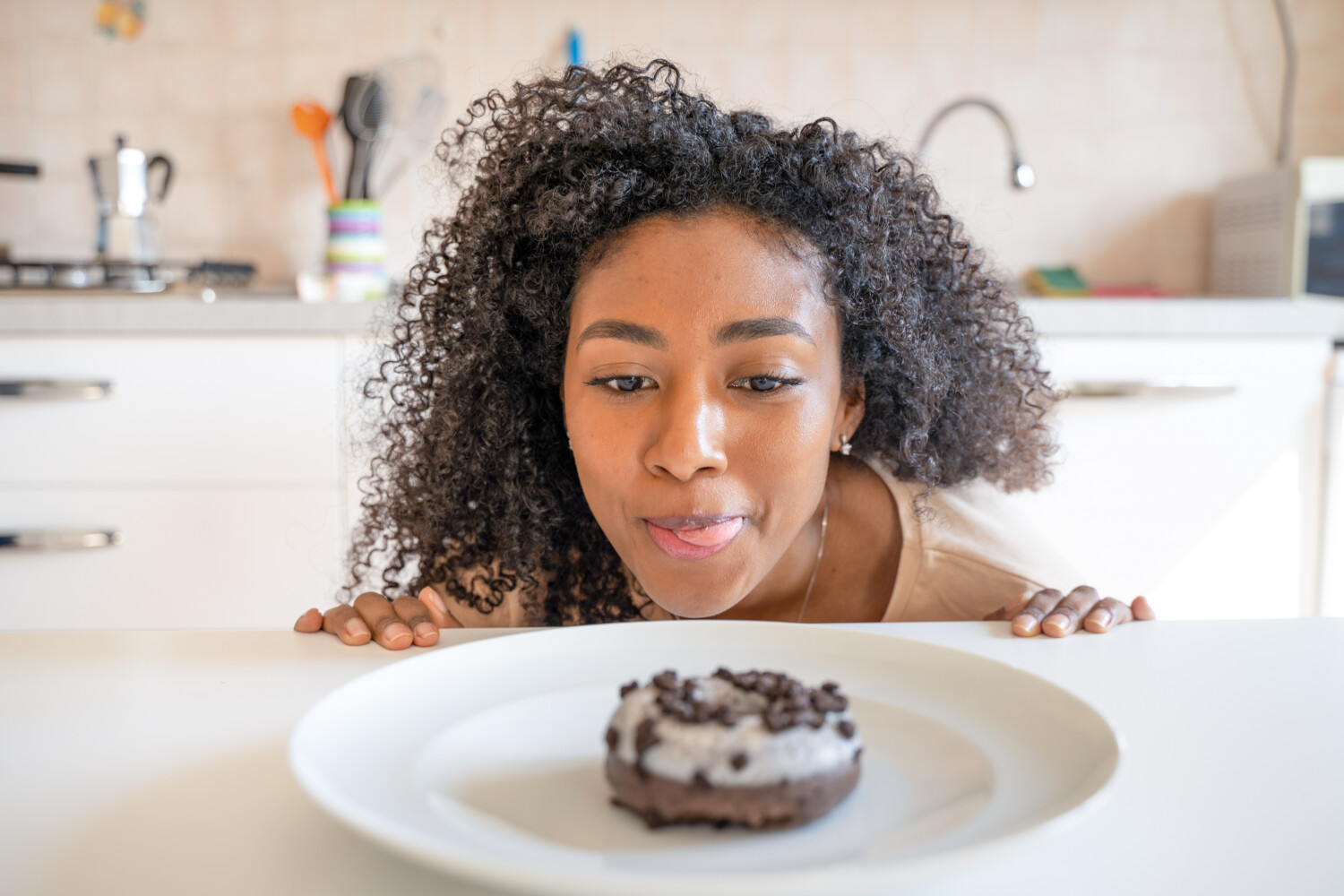The products and services mentioned below were selected independent of sales and advertising. However, Simplemost may receive a small commission from the purchase of any products or services through an affiliate link to the retailer's website.
If you’re one of many Americans who have dieted for years with little success, you may feel defeated and burnt out — you could even be considering giving up on your goals altogether. With so many new diets popping up left and right, knowing which one best suits your body’s needs can be hard.
If you’re looking for a new approach, intuitive eating is a method that focuses on healing our relationship with food by honoring our bodies’ hunger cues. While most diets say no to carbs, sugar or fat, intuitive eating says “Yes!” to all of those things, but only when your body truly feels like eating them.
Releasing the pressure of weight loss is another cornerstone of intuitive eating, as it can help shift your focus to what foods simply feel best for your body, heart and mind. This practice been getting some attention on social media because of its focus on mental health.
Stepping Away From Fad Diets
Many Americans are familiar with fad diets, which tend to focus on weight loss and can lead to crash-and-burn dieting cycles that are difficult to recover from. In fact, research shows that 80% of people who lose at least 10% of their body weight end up regaining it in a year. Yikes.
Because these diets can be very restrictive, they can lead dieters to binge eat as a response to the deprivation. Restrictive diets can also slow down your metabolism, which means you end up packing on more pounds when you finally do indulge.

Ginger Hultin, a spokesperson for the Academy of Nutrition and Dietetics and the owner of Champagne Nutrition in Seattle, spoke with Everyday Health and explained the biology behind this response.
“What you’re dealing with is actually biology,” Hultin says. “It’s so strong, and no amount of willpower or diet plan will let you overcome what the body is programmed to do. As soon as you restrict too much, limiting a macronutrient (carbs, fat, protein) or calories, the body rebels by slowing the metabolism.”
Intuitive eating is designed to abolish this approach to yo-yo dieting. While weight loss is not technically the goal of intuitive eating, those who struggle with deprivation and binge eating may see their weight level out and their metabolism improve as a result of adopting these changes.
It’s important to note that there is no one-size fits all approach when it comes to dieting. However, this is the exact premise intuitive eating is built on, and why it’s risen in popularity in recent years. The idea is that because each body is unique, every person will feel energized and satiated by different foods, and intuitive eating helps you learn which of those foods you can add to your diet.
How Does Intuitive Eating Work?
While intuitive eating may seem novel, it’s actually something humans were born knowing how to do, supporters of the practice say. When we were babies, we cried when we were hungry and ate only until we were full. Adopting the habit of intuitive eating helps us reconnect with these innate hunger cues.
Elyse Resch, a nutrition therapist who claims to have co-created the intuitive eating movement in 1995, explains that her clients carry around “noise” that blocks them from understanding those cues while manifesting itself in a fear of food.
“Learning that they were actually born with all the wisdom they need to be able to eat with trust, and that the problem is simply that they have become disconnected from this wisdom is the key that unlocks the door to freedom,” she says on her website.

While you may think this would lead to all-day binges of pizza, cake or whatever other junk food you could imagine, this is actually not the case. If you need more evidence, people who practice intuitive eating say, ask yourself: Can you remember a time you did that and felt good afterward? Probably not.
Research has shown that our bodies crave a variety of foods, and once you learn how to listen to its cues for hunger, you’ll find you’ll actually crave healthy foods like fruits and vegetables just as much.
MORE: What is the new viral ‘girl dinner’ trend, and is it healthy?
Listening To Your Body
At this point, you’re probably wondering how you can start listening to your body’s cues. To start, experts say you need to learn what it feels like when you’re actually hungry. Because so many people are used to eating at certain times of day or eating according to a specific diet, they’re out of touch with their natural rhythm. When you’re hungry you’ll notice your stomach feels empty and you may experience a gnawing feeling — and this is the exact point when you should reach for a snack or a meal.
However, there are other symptoms of hunger that signal you’ve waited too long to eat. Feelings of irritability, fatigue, dizziness and lack of focus indicate you have not listened to your body’s cues for hunger. This can be problematic, because at this point your cravings for unhealthy foods may intensify, and it may lead to overeating. This is one of the reasons why it’s important to know what hunger feels like at the first stage.
When it comes to what foods to choose, it’s really a question of figuring out what foods fully satisfy us, and also learning to give ourselves the green light when it comes to eating them.

For example, if you crave a sandwich with a side of fries and get to eat it, you’ll probably feel very satisfied and complete with your meal. On the other hand, if you craved the sandwich but maybe convinced yourself to eat a salad instead, even though you may have eaten enough to fill yourself up, you may still be left feeling hungry, frustrated and unsatisfied.
Trusting that we can honor our desires when it comes to food and not go overboard is key, experts say.
Once you’ve started eating, the next question is “How do I know when I’m actually full?” Whether we realize it or not, our bodies are always communicating to us when we’re eating to tell us how much is enough. Slowing down and being mindful when we eat are great ways to learn when our bodies have had enough food. This means we may not finish our plate, which is totally fine.
MORE: The 2023 ‘Dirty Dozen’ pesticides in produce list is out
Benefits and Disadvantages of Intuitive Eating
Intuitive eating isn’t necessarily a pathway to lose (or gain) weight — it’s a way to improve our relationship with food. But it may have other benefits as well.
“As weeks passed I noticed a shift in my feelings around food. Not only did my anxiety disappear over deciding what to eat when everything was fair game, I found myself living more intuitively too,” Ali Francis, a writer who tried intuitive eating, says in Bon Appétit.
When starting out, it’s natural to make mistakes and perhaps over- or under-eat. Having compassion for yourself as you get into the swing of learning your body’s cues is integral to the process of intuitive eating, so be sure to forgive yourself if you don’t always get it right.
Experts say that with time, intense cravings for unhealthy food may actually decrease after you give yourself permission to give in when you want. Practitioners of intuitive eating say this is true.
“My binges stopped once I stopped judging myself for wanting to eat the foods ‘wellness’ vilified, sometimes for reasons other than physical hunger,” wrote Jessica Knoll, a novelist who penned an editorial on intuitive eating for the New York Times.

However, this practice isn’t for everyone. Dietician and counselor Marci Evans notes that the 10 principles of intuitive eating work best for people with inherent privileges, including easy access to food, plus the time, money and agency to focus on it. It may not be as successful for those who process information differently, such as those who are neurodivergent, since they may not be able to read their body’s cues. And it may lead people set unrealistic expectations.
“The fantasy that many people have is that, ‘Okay, if I just do the intuitive eating thing, I’m naturally going to lose weight,’” Evans explains. She says that the principles may become another set of rules that we can fail at, which makes people feel bad again.
Nevertheless, intuitive eating’s tenets are based on scientific research and may be a method that works for some. If you’d like more resources on how to start your intuitive eating journey, you may want to check out a book written by Resch and Evelyn Tribole titled “Intuitive Eating,” which is currently available on Amazon for $12.06.
This story originally appeared on Simplemost. Check out Simplemost for additional stories.


